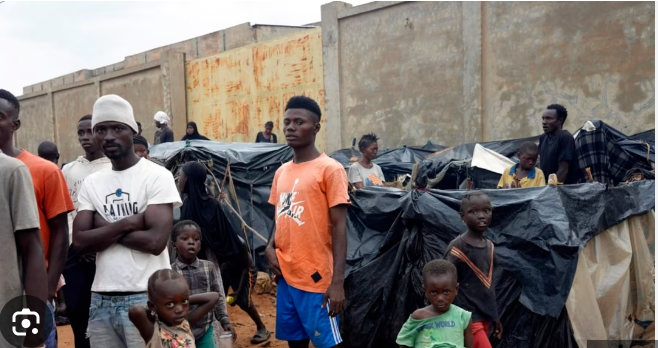By Gift Habib
No fewer than 7,000 migrants to Europe were stranded in the Republic of Niger following the July 26 coup and the subsequent closure of the borders of the francophone country.
The migrants who have been trying to go back home have been trapped in Niger since late July, when members of the presidential guard overthrew the country’s democratically elected President Mohamed Bazoum.
Bazoum was ousted on July 26 in a military coup led by the former commander of Niger’s presidential guard, Abdourahamane Tchiani.
The AP reported on Wednesday that United Nations officials estimate that about 1,800 migrants are living on Niger’s streets because centres run by the International Organisation for Migration were too crowded to take in more. The centres hold about 5,000 people trying to get home.
According to the acting interim chief of mission for the agency in Niger, Paola Pace, the UN agency has been assisting approximately 1,250 people a month to return to their countries this year. But the closure of borders and airspace has forced it to temporarily suspend returns, and its centres are now jammed at 14 per cent over capacity.
“This situation poses challenges for migrants, as migrants staying in these centres may experience heightened stress and uncertainty with limited prospects for voluntary return and already crowded facilities,” she said.
Niger’s junta closed its airspace, and regional countries closed border crossings as part of economic and travel sanctions, making it hard for people to leave.
Niger is an important route for both Africans trying to reach Libya as a jumping-off spot to cross the Mediterranean to Europe and those who are returning to their homes with help from the UN.
The PUNCH has learned that the closure of the airspace has restricted access to the country’s regions, posing difficulties in reaching vulnerable populations in need of aid.
Wagner chief dead
Meanwhile, the founder of Russia’s Wagner Group mercenary force, Yevgeny Prigozhin, has been listed among the passengers on board a plane that crashed north of Moscow, according to Russian state media.
There were earlier reports that speculated that the Wagner chief, who is presumed dead, was a backer of the junta in Niger.
The Russian state aviation authority Rosaviation says that a specially created commission “has begun investigating the circumstances and causes of the accident with the Embraer-135 aircraft, which occurred on August 23 in the Tver region.”
The authority’s statement said the plane belonged to MNT-Aero LLC, which specialises in business transportation, the BBC reports.
“According to preliminary data, there were seven passengers and three crew members on board the aircraft, which flew on the Moscow-St. Petersburg route,” the authority said.
“The Commission of the Federal Air Transport Agency is starting initial actions at the scene of the accident and has also begun collecting factual materials on the training of the crew, the technical condition of the aircraft, the meteorological situation on the flight route, the work of dispatch services, and ground radio equipment,” the statement added.
“At this stage of the investigation, specialists will also have to search for on-board means of objective control for their subsequent decoding and analysis of the records of the “black box,” the authority said.
UK minister, service chiefs meet
In a separate report, the United Kingdom’s Minister for the Armed Forces, James Heappey, met with top defence leaders and military chiefs to deepen defence cooperation between both countries and discuss the situation in Niger.
This was contained in a statement by the British High Commission in Abuja and made available to our correspondent on Wednesday.
Leaders in the Economic Community of West African States Commission bloc said that they would keep all options on the table for a peaceful resolution to the crisis and ordered the activation of an ECOWAS standby force to restore constitutional order in Niger.
Former colonial ruler, France and the European Union suspended security cooperation and financial aid to Niger following the coup, while the United States warned that its aid could also be at stake.
Britain had condemned attempts to undermine democracy, peace, and stability in Niger and said it stands by ECOWAS in their efforts to restore stability in Niger.
During Heappey’s visit, he met with senior leaders within the Nigerian Ministry of Defence, as well as the Chief of Defence Staff and Chief of Army Staff.
He also met with the ECOWAS Chairman, Bola Tinubu, where he reiterated the UK’s support for ECOWAS’ ongoing diplomatic efforts to ensure a peaceful return to democracy in Niger.
According to the statement, the minister said the UK and the Nigerian armed forces have a long-standing security and defence relationship, underpinned by a shared desire to support regional and international peace and security.
He said, in part, “The UK supports ECOWAS in calling for the peaceful restoration of constitutional order and democracy in Niger, and we’ll work with both ECOWAS and our partners across West Africa to support them in that aim.”
Meanwhile, West Africa’s chief mediator in the Niger crisis, ex-Nigerian military leader Gen. Abdulsalami Abubakar, told the BBC on Wednesday that military intervention remains the last option to resolve the situation in the country.
He said his delegation from the regional grouping ECOWAS has started negotiating with military junta leader Gen. Abdourahmane Tchiani and expressed hope for an amicable resolution.
Gen. Tchiani earlier announced a three-year transition plan at the weekend, which ECOWAS rejected.
Source: The Punch








